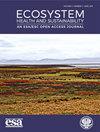从地理空间到时间分离——固定资本碳核算研究综述
IF 3.4
2区 环境科学与生态学
Q1 ECOLOGY
引用次数: 1
摘要
提供准确碳核算的科学系统方法是应对气候危机的基本前提。碳核算体系已从以生产为基础的核算(衡量地区排放量)演变为以消费为基础的会计,逐渐涵盖空间和时间分离。从而提高了它的科学性。固定资本的时间分离(过去的生产和当前的消费之间)最近引起了人们的兴趣,但由于长期的忽视,全景式的概述仍然很少存在。本研究将定量分析与文献综述相结合,系统分析了碳核算的历史发展和现状,特别是对内生固定资本的研究,以定位热点并预测未来趋势。目前对固定资本内生的研究主要采用流量矩阵和增广法来分析总量和结构以及与传统研究结果的差异,尚处于初步上升阶段;然而,过程分析和影响因素识别还不够充分。因此,本研究提出了基于代谢角度分析碳时空转移整个过程的未来途径,并考虑初始输入因素以确定关键驱动因素,这将为政策制定提供新的思路和视角。本文章由计算机程序翻译,如有差异,请以英文原文为准。
From Geospatial to Temporal Separation: A Review on Carbon Accounting Endogenizing Fixed Capital
A scientific and systematic approach that provides accurate carbon accounting is a fundamental prerequisite for responding to the climate crisis. The carbon accounting system has evolved from production-based accounting measuring territorial emissions to consumption-based accounting, gradually covering spatial and temporal separation. Its scientificity is thus enhanced. The temporal separation (between past production and current consumption) from fixed capital has become of recent interest, but a panoramic overview still rarely exists because of longstanding neglect. Combining quantitative analysis with a literature review, this study systematically analyzed the historical development and current state of carbon accounting, especially on studies endogenizing fixed capital, to locate hotspots and predict future trends. The current studies with fixed capital endogenization mainly use a flow matrix and augmented method to analyze the total and structure and the difference with traditional results, which are still in the initial rise stage; however, the process analysis and influence factor identification are insufficient. Therefore, this study proposes future avenues for analyzing the entire process of spatial and temporal carbon transfer based on a metabolic perspective and considering the initial input factors to identify the key drivers, which will provide new ideas and perspectives for policy formulation.
求助全文
通过发布文献求助,成功后即可免费获取论文全文。
去求助
来源期刊

Ecosystem Health and Sustainability
Environmental Science-Management, Monitoring, Policy and Law
CiteScore
7.10
自引率
2.00%
发文量
40
审稿时长
22 weeks
期刊介绍:
Ecosystem Health and Sustainability publishes articles on advances in ecology and sustainability science, how global environmental change affects ecosystem health, how changes in human activities affect ecosystem conditions, and system-based approaches for applying ecological science in decision-making to promote sustainable development. Papers focus on applying ecological theory, principles, and concepts to support sustainable development, especially in regions undergoing rapid environmental change. Papers on multi-scale, integrative, and interdisciplinary studies, and on international collaborations between scientists from industrialized and industrializing countries are especially welcome.
Suitable topics for EHS include:
• Global, regional and local studies of international significance
• Impact of global or regional environmental change on natural ecosystems
• Interdisciplinary research involving integration of natural, social, and behavioral sciences
• Science and policy that promote the use of ecological sciences in decision making
• Novel or multidisciplinary approaches for solving complex ecological problems
• Multi-scale and long-term observations of ecosystem evolution
• Development of novel systems approaches or modeling and simulation techniques
• Rapid responses to emerging ecological issues.
 求助内容:
求助内容: 应助结果提醒方式:
应助结果提醒方式:


